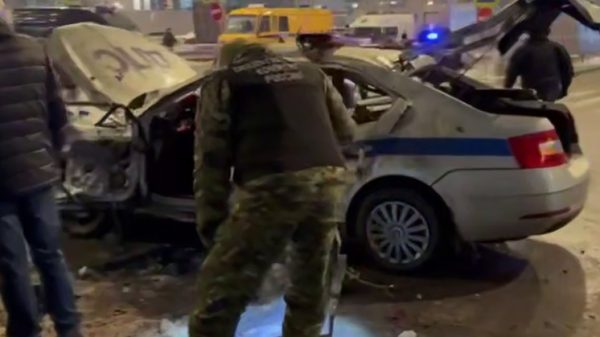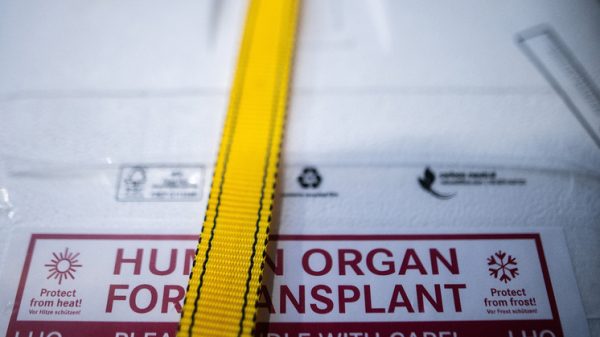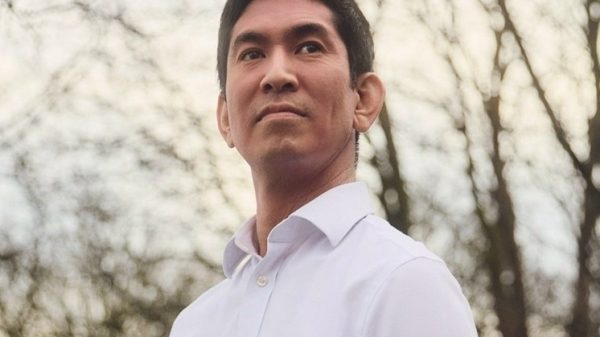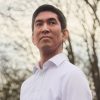 Polls show that Nayib Bukele and his New Ideas political party have about 80 percent intentions to vote in the presidential election. Photo: Oscar Rivera/AFP
Polls show that Nayib Bukele and his New Ideas political party have about 80 percent intentions to vote in the presidential election. Photo: Oscar Rivera/AFP
For years, the Mara Salvatrucha, one of the most violent street gangs on earth, brutally controlled every aspect of life in Italy, a leafy working-class suburb of single-story houses near San Salvador, the capital of El Salvador.
Echoing the situation in communities in the impoverished Central American country of six million, people in Italy will cower at home as heavily tattooed gang members rob, extort, rape and kill at will.
No more. The gang members are gone, most of them are locked up, and the area has returned to life: locals linger in the streets and squares even after dark, chatting with old friends, trying to take a break from the tropical heat.
For Maura, a 34-year-old housewife, this meant doing something previously unthinkable: allowing her two teenage daughters to play outside and even ride her bike out of sight around the block.
“ I used to I was afraid that some gang member would force one of them to go on a date with him, and if she refused, she would be killed,” says Maura, who declined to give her real name for fear of reprisals if the gang returned. to Italy.
– Even the police wouldn’t come here. President, he ensured our safety. He needs to win again. If he doesn’t do this, I will have to emigrate.”
The president she is talking about is Nayib Bukele. El Salvador's controversial millennial leader, who once called himself «the world's toughest dictator,» is expected to win re-election by an overwhelming margin in Sunday's presidential election.
Polls show he and the New Ideas political party he founded have about 80 percent of the vote. His closest rival, Manuel Flores, of the leftist Farabundo Martí National Liberation Front, which ruled El Salvador for a decade before Bukele's election in 2019, has just four percent.
This is largely thanks to Bukele's draconian actions. a crackdown on Mara gangs that resulted in the incarceration of approximately 77,000 suspected members—roughly two percent of the adult population.
This impact has transformed El Salvador, a tiny country with a huge homicide problem. In 2018, just before Bukele came to power, El Salvador's annual murder rate was 52 murders per 100,000 inhabitants — one of the highest in the world and about 50 times higher than the UK.
Now it is fell to 2.4, his government says, making it one of the safest societies in Latin America.
In practice, this meant that ordinary Salvadorans like Maura were resuming lives suspended by the rampant bloodshed that could suddenly, accidentally, at any time.
No longer worried about being extorted for every last penny, she is now considering opening a corner store in Italy to generate much-needed extra income for her family.
 An apron with the face of Nayib Bukele, President of El Salvador, sold at the Ex Cuartel market in San Salvador. Credit : MARVIN RETZINOS/AFP
An apron with the face of Nayib Bukele, President of El Salvador, sold at the Ex Cuartel market in San Salvador. Credit : MARVIN RETZINOS/AFP
However, Bukele's success in ending the gang war came at a high price. Human rights norms are routinely flouted while a climate of fear grows as Bukele and his cybermobs of online trolls attack journalists and others who dare question his growing authoritarianism and alleged corruption.
The United States even blacklisted. several of his closest allies for negotiating a secret illegal truce with the Mars. They are accused of offering imprisoned gang leaders everything from cellphones to prostitutes, calling into question Bukele's tough commitment to law and order.
Meanwhile, the president's grand economic plans, including his adoption of Bitcoin as the national currency — to the bewilderment of ordinary citizens — appear to have stalled.
His £12 billion Bitcoin City project has yet to break ground. Almost 90 percent of Salvadorans did not use cryptocurrency in 2023. The national debt is at a three-decade high of around £20 billion, and extreme poverty has doubled since Bukele came to power.
Many fear that 42 Two-year-old former advertising executive and avid user of TikTok and X, formerly known as Twitter, is indeed on the verge of becoming the latest in a long line of Latin American despots.
 Mural depicting Nayib Bukele, President of El Salvador, in the Zacamil neighborhood of San Salvador Photo: YURI CORTEZ/AFP < p>Under Bukele's declared national emergency, constitutional rights were suspended, allowing arrests based on unverified reports, detention without charges, and unrestricted government access to citizens' emails, text messages and phone calls.
Mural depicting Nayib Bukele, President of El Salvador, in the Zacamil neighborhood of San Salvador Photo: YURI CORTEZ/AFP < p>Under Bukele's declared national emergency, constitutional rights were suspended, allowing arrests based on unverified reports, detention without charges, and unrestricted government access to citizens' emails, text messages and phone calls.
Human rights groups say wrongful detentions by police desperate to meet arrest quotas are widespread and have documented thousands of cases.
Often, suspects are detained for not paying money to police officers or because a vindictive neighbor anonymously accuses them of being a gang member, says Samuel Ramirez, an IT engineer in San Salvador who founded the Movement for Regime Victims.
“We no longer have rights. There is no due process. You won’t even have a trial,” Ramirez says. “The whole point is that Bukele wants more and more power and instills fear in the entire population.”
Torture allegations
Nearly half of those detained are being held at the new mega-prison, a half-hour drive away. San Salvador, considered the largest in the world. Prisoners leave their severely overcrowded cells only for interrogation or strip searches, and there are numerous reports of torture and deaths in custody.
But rather than answer serious questions about human rights and economic policy, Bukele has vilified his critics, including El Faro, an award-winning news site that was forced to move its administrative headquarters to Costa Rica to avoid fines and charges of tax evasion.
Julia Gavarrete, one of the reporters who discovered Pegasus spyware secretly installed on her phone, is concerned that Bukele's authoritarianism will increase if he is re-elected.
“Attacks from him and its officials are already aggressive. I’m worried that this will lead to physical attacks,” she said. “I think this may just be the beginning and worse things are ahead.”
However, democracy is the least of most people's worries in Italy. “Only God and the president know if they detained innocent people,” Maura says. “Gang members were arrested here. God sent him [Bukele] here to do this.”
El Salvador's constitution allows only one term for each president. But Bukele filled the Constitutional Court, which then proposed an incredible new interpretation allowing him to stand for re-election.






















































Свежие комментарии